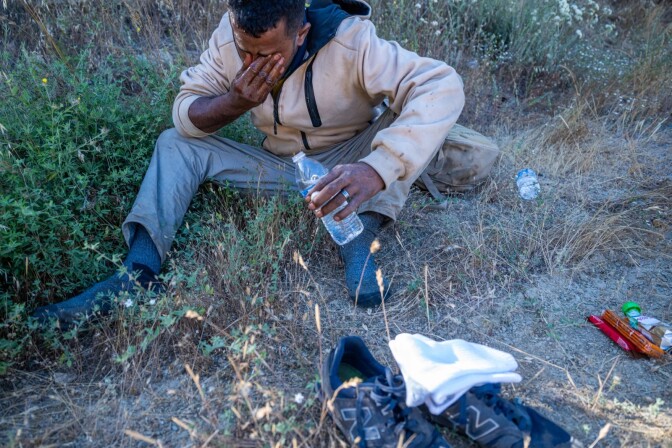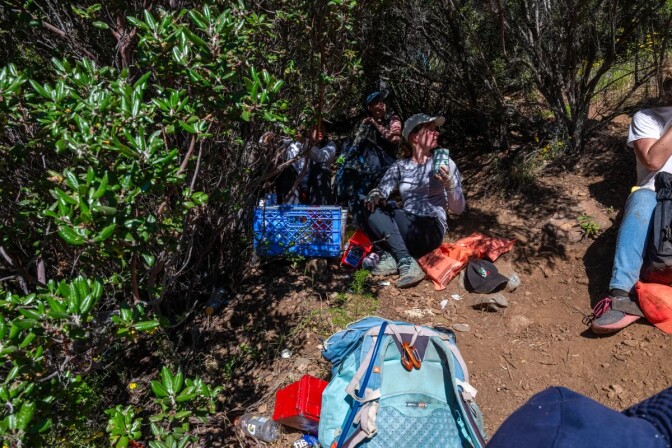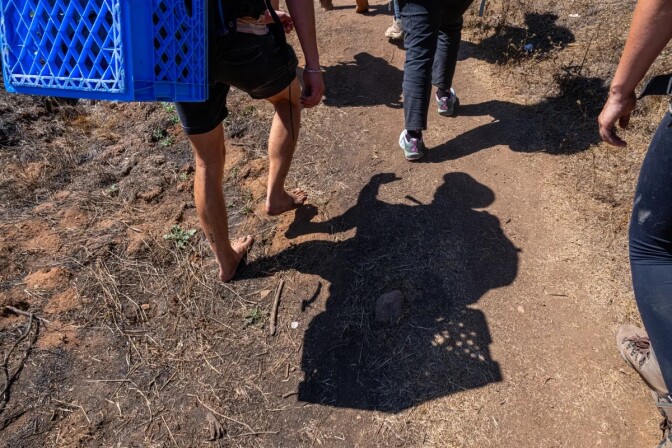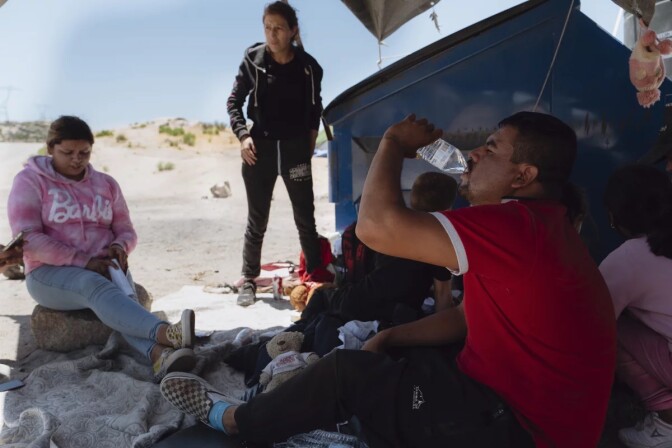This story is free to read because readers choose to support LAist. If you find value in independent local reporting, make a donation to power our newsroom today.
California heat has immigration activists bracing for a humanitarian crisis

SAN YSIDRO MOUNTAINS, Calif. — It’s dawn at the foot of the Otay Mountain, and the heat is already nauseating.
Even this early in the morning, temperatures near this 3,500-foot peak reach triple digits, with this whole section of the U.S.-Mexico border under an excessive heat warning.
Into this baking wilderness hike volunteers with Borderlands Relief Collective, a group of private citizens from the San Diego area who deliver water and first aid to migrants crossing into the U.S.
Almost as soon as they start climbing up the mountain, the group encounters a man sitting on the side of the road. He breaks into tears when he sees the volunteers approaching with water.
He is dehydrated and wearing shoes too small for his feet. In broken English, he says his name is Taleb, and he’s from Mauritania. Before NPR can get a last name, he’s rushed aside to receive care.

This summer, temperatures in California have soared to record-breaking highs, with some parts approaching the hottest ever recorded on the planet.
The volunteers say this extreme weather, combined with new asylum restrictions, is creating a humanitarian crisis along this part of the border.
Over the course of the day, the group runs into dozens of migrants like Taleb, suffering from dehydration and exhaustion after walking miles to get into the U.S.
Most say they were told by coyotes (guides who cross people over the border for a fee) to make the journey at night in order to avoid the hottest temperatures. But the terrain is difficult and takes a long time to navigate, so they end up under the scalding sun, with barely enough water.
Deaths along the border rise with temperatures
The United Nations says the U.S.-Mexico border is the deadliest land route for migrants in the world.
According to U.S. Customs and Border Protection (CBP), migrant deaths in the San Diego sector have been rising for years. Just last year, 39 people died while trying to cross the border with Mexico, compared to four deaths in 2018. According to the most recent CBP report, the overwhelming majority of deaths on the border are because of "environmental exposure/heat."
Volunteers say they regularly see medical emergencies out here: severe dehydration, a miscarriage and infected insect bites. And they say it’s getting worse because of extreme heat.
“We’re all very worried about the coming months, what will happen," says David Greenblatt, a volunteer who is also a surgeon in a San Diego hospital. "It’s just going to get hotter and hotter and hotter.”


Immigration analysts expect recent immigration restriction policies from the Biden administration will exacerbate the situation.
In recent weeks, the White House has essentially closed down the border to most undocumented people seeking asylum. In the past, policies like these pushed desperate migrants to attempt to cross through more dangerous and deadly areas where they are less likely to be intercepted.
Along the California-Mexico border, the effects of these policies are already apparent.
Threats back home drive border crossings despite the heat
Near the border wall on the U.S. side, a family with three small children rests in a makeshift tent. They look like a mirage, surrounded by wilderness and discarded objects from migrants who passed through before them: crusty clothing, empty bottles of water and food wrappers.
The buzzing of electricity from a nearby power line adds to an eerie scene.

The family says they were dropped off in this area by Border Patrol and told to wait to be picked up. That was nearly six hours ago, they say.
In previous years, most migrants crossing through this area were single men. But in recent months, the San Diego region has seen a dramatic increase in families like this one, seeking asylum.
Javi, the 7-year-old boy, is very shy. He’s holding a teddy bear. The bear’s name is Balun, he says, and has been his companion on the long journey from Michoacán, Mexico.
When asked how Balun has been holding up.
“Caluroso,” he answers. Balun feels very hot.
This family says they are fleeing from the cartel violence that has consumed parts of Mexico.

Javi’s mother, Jazmin Mora, says she heard all kinds of rumors on her way to cross the border: that the heat can kill you, that there are rattlesnakes and mountain lions, and that the U.S. border is closed.
But Mora says they had no choice but to risk it because her family kept getting threats and were victims of extortion.
“Why would anyone put their kids through this?” she asks.
It’s high noon and the sun is scalding. It feels difficult to breathe out here, and the hot breeze provides no respite.
Still, she says, the risk of staying outweighed the risk of crossing.
Copyright NPR 2024







